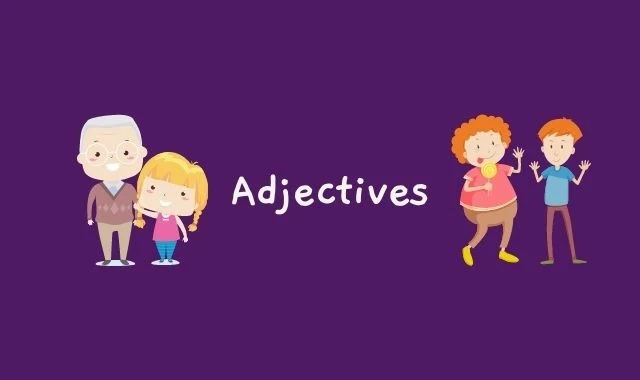Adjectives
Imagine describing a breathtaking sunset without using the words "vibrant," "golden," or "serene." It's nearly impossible, right? Adjectives are the colorful tools that bring our language to life, adding depth and detail to the nouns and pronouns they modify. Whether you're a student eager to enrich your vocabulary or a writer aiming to paint vivid pictures with your words, mastering adjectives is essential. Join us as we explore the fascinating world of adjectives, from the basics to the more nuanced aspects, ensuring your descriptions are always spot-on.
What is an adjective?
WHAT KIND mountainous landscape
WHICH ONE last chance
HOW MANY three minutes
HOW MUCH enough equipment
EXAMPLE
- The travelers felt weary and uncomfortable. [The adjectives weary and uncomfortable appear in the predicate. Both adjectives describe travelers.]
Articles
What are the three articles?
A, an, and the, called articles, are the most frequently used adjectives.
A and an refer to any member of a general group and are called indefinite articles.
The is the definite article because it refers to a specific person, place, thing, or idea.
A and an refer to any member of a general group and are called indefinite articles.
The is the definite article because it refers to a specific person, place, thing, or idea.
EXAMPLE
- An owl landed on the tree branch. [An refers to a member of a general group, owl. The refers to a specific thing, branch.]
Proper Adjectives
What is a proper adjective?
A proper adjective is an adjective that is formed from a proper noun.
PROPER NOUN
- Look at this satellite photograph of the United States. [United States is a proper noun.]
PROPER ADJECTIVE
- She is going to become a United States citizen. [United States is a proper adjective telling what kind of citizen.]
Attributive and Predicative Adjectives
Most adjectives can occur both before and after a noun:
- the blue sea ➡ the sea is blue
- the old man ➡ the man is old
- happy children ➡ the children are happy
Adjectives in the first position - before the noun - are called ATTRIBUTIVE adjectives. Those in the second position - after the noun - are called PREDICATIVE adjectives. Notice that predicative adjectives do not occur immediately after the noun. Instead, they follow a verb.
Sometimes an adjective does occur immediately after a noun, especially in certain institutionalised expressions:
- the Governor General
- the Princess Royal
- times past
We refer to these as POSTPOSITIVE adjectives. Postposition is obligatory when the adjective modifies a pronoun:
- something useful
- everyone present
- those responsible
Postpositive adjectives are commonly found together with superlative, attributive adjectives:
- the shortest route possible
- the worst conditions imaginable
- the best hotel available
Most adjectives can freely occur in both the attributive and the predicative positions. However, a small number of adjectives are restricted to one position only. For example, the adjective main (the main reason) can only occur in the attributive position (predicative: *the reason is main). Conversely, the adjective afraid (the child was afraid) can only occur predicatively (attributive: *an afraid child).
Adjectives Practice
$$
Adjectives Quiz
Choose the word that is an adjective.
FAQs
What are adjectives?
Adjectives are words that modify nouns and pronouns. Adjectives provide more details about nouns and pronouns by answering questions like "What kind?" "How many?" or "Which one?".
What do adjectives do?
Adjectives describe, identify, quantify, qualify, and modify nouns and pronouns.
What are some examples of adjectives?
Examples of adjectives:
- Descriptive adjectives: tall, blue, sweet, scary
- Quantitative adjectives: some, many, few, several
- Possessive adjectives: my, your, his, her, its, our
- Demonstrative adjectives: this, that, these, those
- Interrogative adjectives: which, what, whose
- Indefinite adjectives: any, no, every, some
Where do adjectives go in a sentence?
Most adjectives go before the noun they modify (attributive position). They can also go after verbs like "to be" (predicate position).
How do you compare adjectives?
Adjectives can be graded for comparison using the suffixes -er for the comparative and -est for the superlative. For example: cold, colder, coldest.
Can adjectives be modified by adverbs?
Yes, adverbs can modify adjectives to provide more details about them. For example: "The extremely tall man."
Conclusion
Adjectives are the unsung heroes of our sentences, quietly working behind the scenes to transform the mundane into the extraordinary. They allow us to add flavor to our language, making our stories richer and our descriptions more vivid. Whether you're describing the "majestic mountains" or the "whispering winds," these little words have the power to paint entire worlds in the minds of your readers.
In your journey to master adjectives, you'll find that they offer endless possibilities. They can make your writing more precise, your arguments more convincing, and your conversations more engaging. So, next time you find yourself at a loss for words, remember that the right adjective is out there, waiting to bring your thoughts to life.
In the end, adjectives are more than just grammatical tools; they're the paintbrushes that color our language, reflecting the beauty and complexity of the world around us. So go ahead, sprinkle your sentences with the right adjectives, and watch as your words come alive.
Resources
- The Associated Press Stylebook 2020, Associated Press, 2020.
- The Chicago Manual of Style, 17th Edition, University of Chicago Press, 2017.
- Garner's Modern English Usage, 4th Edition, Bryan A. Garner, 2016.
- Webster's New World College Dictionary, 5th Edition, Houghton Mifflin Harcourt, 2018.
- The Gregg Reference Manual, 11th Edition, William A. Sabin, 2011.

